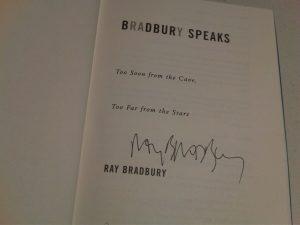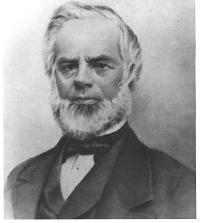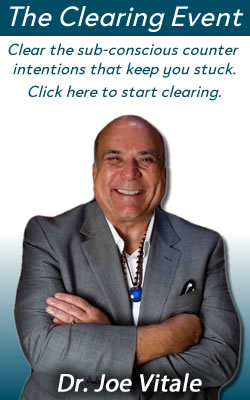Joe Vitale
"The Checklist Manifesto"
When I earned my private pilot’s license in 1972, I learned the value of a checklist. No pilot then or today is allowed to take off from the airport without going through the checklist. It’s a simple but essential tool to ensure safety. Since flight problems were often due to pilot error, or in not knowing how to handle a problem that surfaced in flight, having the pilot use a checklist virtually guarantees nothing gets overlooked.
According to a new book by Atul Gawande, called The Checklist Manifesto, some hospitals are starting to use checklists. Given the chaotic nature of emergency rooms and numerous medical situations, creating a checklist for every scenario is a long, tedious process. But once it’s completed, it saves lives and reduces complications.  Ever since 1972 I wanted to write a book on checklists, or many even create a checklist for every industry or profession. For example, I’ve used checklists for writing advertisements, sales letters and websites. (Most are in my out-of-print book, The AMA Complete Guide to Small Business Advertising, written for the American Marketing Association in 1995.) Assuming you don’t need a checklist is the ego trap that causes errors. We all need them.
Ever since 1972 I wanted to write a book on checklists, or many even create a checklist for every industry or profession. For example, I’ve used checklists for writing advertisements, sales letters and websites. (Most are in my out-of-print book, The AMA Complete Guide to Small Business Advertising, written for the American Marketing Association in 1995.) Assuming you don’t need a checklist is the ego trap that causes errors. We all need them.
The pizza parlor needs one. So does the CPA, speaker, web site designer, SEO expert, blogger, baby sitter, luthier, and everyone else.
I suggest you sit down and write out all the steps you take to accomplish what you do for a living. For example, if you are a consultant or therapist, what are the steps you take to help your client reach success? I’m aware that there is often a need for space to allow intuition, but the basic steps should be mapped out so you don’t forget them.
When you consider that pilots with thousands of hours of flight time still have to use a checklist before they take off, you should create and use one for what you take for granted. It’ll increase your success rate and keep your ego in check.
I don’t think you need to read Gawande’s book to get his message. But if you want to read about the history of the checklist, and the adventure of creating one for hospitals, his book is riveting.
Ao Akua,
PS — Check this: Read my latest book for free by clicking on the below banner:
Dr. Joe Vitale 56th Birthday Party
My birthday party on December 29, 2009 was a blast. Yes, I paid to have the singer and yes, I paid my own meal, but people came far and wide bringing gifts and celebrating my 56th with me. It was held at the Vitale Cigar Bar. The incredible Sarah Marie sang opera to me once again. You can get a taste of the love by clicking on the image below. Enjoy!
Attracting Kindle
I attracted a Kindle for Christmas. It’s the wildly popular device from Amazon for reading books, magazines, newspapers, select blogs, and more without actually carrying anything more than the thin, light device itself.
I’m such a bookaholic that I wasn’t sure I wanted one. But I’m also a gadget nut and curious enough to try it. So I told Santa and he delivered.
The Kindle is light, intuitive, easy to use, and fast. Mine is the 6″ display, Global Wireless, Latest Generation, which I prefer for all the travel I do, but there is a US only version with a bigger screen (9.7″), called the Kindle DX.
After charging the battery, I turned it on and started using it within minutes. I synced it to my existing Amazon account and wondered what book I should buy first.
Since I had been reading Bruce Lee’s philosophy of living, called Striking Thoughts, I thought it might be cool to have it on my Kindle. I could look at it every day, chew on some Kung Fu (actually Jeet Kune Do) wisdom, and not have to lug the actual book around.
 That’s when I discovered not all books are on Kindle. Striking Thoughts wasn’t listed. But a few other books by or about Lee were. I ended up choosing Bruce Lee’s Strength Training Secrets, a booklet by Justin Frost. I’ve always been interested in martial arts (Aikido, Chi Kung) and strength training (Steve Reeves/Hercules), so this would be a good first Kindle download for me.
That’s when I discovered not all books are on Kindle. Striking Thoughts wasn’t listed. But a few other books by or about Lee were. I ended up choosing Bruce Lee’s Strength Training Secrets, a booklet by Justin Frost. I’ve always been interested in martial arts (Aikido, Chi Kung) and strength training (Steve Reeves/Hercules), so this would be a good first Kindle download for me.
It cost less than a dollar. I selected it and within a minute it was on my device. While the look and feel of the text on the Kindle was more like a poor quality newspaper, or even an old mimeograph, and the pictures are more like x-rays, the instant gratification couldn’t be beat. The only thing better might be a direct download into my brain.
Side note: Bruce Lee sometimes trained with a Bullworker, an isometric exercise device I bought when I was sixteen years old — about forty years ago — and still sold today. I still have my original Bullworker, but doubt I’ve ever used it as much as Bruce Lee used his.
I wondered what book I would buy next. I have about $1,000 worth of books sitting in my shopping cart at Amazon. I picked a few of those titles and searched to see if they were available on Kindle. Most weren’t. That was a tad frustrating. But no matter, I was having fun shopping.
I searched again and found the complete works of James Allen (As A Man Thinketh, From Poverty to Power, etc) were ready for download. Called Mind Is the Master, I now have it on my Kindle.
The next book was Keith Cameron Smith’s The Top 10 Distinctions Between Millionaires and the Middle Class. This one has some great insights. As I was reading, I came across a line that was so good I re-read it three times:
“Middle-class people talk about things that came from a millionaire’s idea.”
Thanks to a feature on Kindle, I was able to hi-light that line and save it in my “My Clippings” folder. Way cool. I just wish there was a way to email the things in my clippings folder on Kindle to my Twitter, or blog, or email account. To share it with you here, I had to open the Kindle, open the clippings folder, and then re-type the line for you here. Not a tedious process but in this day I would think we could make it even easier.
Side note: Don’t underestimate the power of Smith’s quote. I told it to Pat O’Bryan and master photographer Rodney Bursiel one evening and their heads reeled as they considered what it meant and I explored the implications out loud. In short, if you want to attract more money, create the products and services that make the middle class talk — and buy.
The next book was Facts Can’t Speak For Themselves: Reveal The Stories That Give Facts Their Meaning by Eric Oliver. This is a book on persuasion for trial attorneys. It’s about how the mind creates stories out of facts, but often without the ending story actually being faithful to reality. To be sure you communicate what you intend, you have to be aware of how people frame information. If you’ve read my books, such as Hypnotic Writing and/or Buying Trances, you know how important it is to get your message across accurately. Oliver’s book is hefty and expensive (even for Kindle) but, so far, well worth the time it takes to absorb it.
Obviously, I’m enjoying my Kindle. It even seems to assist my focus. Instead of reading a dozen books all at once, jumping from book to book on my desk or night stand, Kindle gently leads me to pick one book and keep reading it until I’m done.
I also like that I have a special Kindle e-mail address that I can send e-books to, which then get downloaded direct to my Kindle. Amazon mentions a “small fee” for this service, but I can’t find what that charge actually is.
To test it, I emailed the PDF version of my latest book, Attract Money Now, to my Kindle. It showed up just fine. I then went to Amazon, went into my account, looked up my Kindle charges, and saw the transfer cost was sixty cents. I’d prefer free. I later discovered I can put ebooks on my Kindle for free by plugging the USB port from my PC to my Kindle, and then just dragging the ebooks over. Easy.
On Christmas day, I showed the Kindle to a friend. She quickly figured it out, liked it, and even accidentally bought a book on it. She clicked on a book cover and before she knew it she had clicked on the buy-it-now button. She didn’t know the purchase or delivery would be so instantaneous. Fortunately it was a book on Reiki (The Original Reiki Handbook by Mikao Usui) which I wanted to read anyway.
I like my Kindle. It has some features I haven’t tried yet, such as reading books to you, but for what I’ve done with it so far, it’s cool. I’d like to see it have color, improve its screen, and make it less sterile. I still love printed books and still prefer paper, color, and all the other elements that make a book real.
 For example, I received two copies of beautiful printed books, one signed by sci-fi writer Ray Bradbury and the other signed by comedian Jerry Lewis. Both came as gifts. Both are hardcovers. Both are collectibles. Kindle will never replace those.
For example, I received two copies of beautiful printed books, one signed by sci-fi writer Ray Bradbury and the other signed by comedian Jerry Lewis. Both came as gifts. Both are hardcovers. Both are collectibles. Kindle will never replace those.
But when it comes to traveling and convenience, the Kindle is great. I’ll be curious to see what the other devices are like, such as Barnes & Noble’s new e-reader, called Nook, which has color and over a million titles to choose from. And geniuses such as Ray Kurzweil are creating ways to read books in full color on any device, with programs such as his new Blio. Of course, I’ll also be waiting to see how Amazon upgrades Kindle over time.
For now, I’ll keep my Kindle. It’s where I can easily find such relevant Bruce Lee gems as this –
“To change with change is the changeless state.”
Right on, Bruce.
Ao Akua,
PS — You can’t yet read my new book Attract Money Now on Kindle (unless you already have the PDF and email it to your Kindle or transfer it over with a direct USB link, as mentioned above), but you can still get the PDF and read it for free by clicking the below banner:
"Got Spirit?"
Years ago I wrote a dissertation for my Doctorate in Metaphysical Science called “Got Spirit”? It was an in-depth study of the most popular metaphysical, new thought and new age movements and the marketing practices their founders used to establish them.
I wrote it because so many people seem to have a negative attitude toward money and marketing that I wanted to see for myself how the biggest and most famous spiritual movements got that way.
I suspected the greatest meta-physicians — from Jesus to Phineas Parker Quimby to Mary Baker Eddy to Ernest Holmes to Mother Teresa — were all comfortable with money and either did marketing or had someone do it for them.
It was an illuminating study. Turns out every one of these spiritual teachers and their movements knew the value of money and marketing. Each did everything from writing, speaking and advertising to publicity events to get attention and attract followers.
If that’s the case, then why do most metaphysical practitioners today — most people, period — dislike marketing and money?
The most obvious answer is they believe, “God will provide.”
That reminds me of the story of the man with a beautiful garden in his backyard. One day a man walked by, saw it, and stopped to admire it.
“You have an amazing garden here,” the stranger said.
“Thank you,” said the owner.
“It’s really God’s garden, isn’t it?”
“Yes, it is,” replied the owner. “But you should have seen it when God had it all by Himself.”
 The point is, God (or the Divine or Nature) provides us with the basics, and we have to do something with what we’ve been given. If we just allow things to grow in the backyard, we’ll have a jungle, not a garden. Someone has to tend to the earth. Even if we’ve been given (or learned) the talent to heal, we have to let people know we have it for us to be able to use it. In other words, we have to spread the word.
The point is, God (or the Divine or Nature) provides us with the basics, and we have to do something with what we’ve been given. If we just allow things to grow in the backyard, we’ll have a jungle, not a garden. Someone has to tend to the earth. Even if we’ve been given (or learned) the talent to heal, we have to let people know we have it for us to be able to use it. In other words, we have to spread the word.
That’s marketing.
It’s no different than what Jesus, Phineas Parker Quimby (pictured above), Mary Baker Eddy, or even Mother Teresa did. If someone hadn’t helped them spread the word, we wouldn’t know of them today.
The success of Unity Church is a case in point. Charles and Myrtle Fillmore managed to raise all the money they needed to build and expand their business. It wasn’t until 1942 that the real secret of their financial support was revealed. The Fillmores had created a now famous “Dedication and Covenant” on December 7, 1892, that read:
“We, Charles Fillmore and Myrtle Fillmore, husband and wife, hereby dedicate our selves, our time, our money, all we have and all we expect to have, to the Spirit of Truth, and through it, to the Society of Silent Unity.
“It being understood and agreed that the said Spirit of Truth shall render unto us an equivalent for this dedication, in peace of mind, health of body, wisdom, understanding, love, life and an abundant supply of all things necessary to meet every want without our making any of these things the object of our existence.
“In the presence of the Conscious Mind of Christ Jesus, this 7th day of December, 1892 A.D.”
Please note that while the Fillmores signed an agreement with Spirit, they also wrote, published and distributed materials to market their message and their offerings. In short, they had to do both: Implement marketing and work with Spirit. I call it the phrase I coined: Spiritual Marketing. It could have easily been called Spiritual Money.
The point here is that money and marketing are not separate from Spirit at all. They are in fact Spirit.
When someone says, “I don’t care about money, I just want to follow Spirit,” they are revealing their own limitations about the reality of the world.
Money is Spirit.
Saying you aren’t interested in money, or marketing, is a form of self-delusion. You don’t need to be in love with money to appreciate it and attract it. When you realize it’s a tool of Spirit, you are in a position to create miracles.
Dr. Hew Len, my coauthor for the book Zero Limits, is clear that money is of Spirit. He uses the ho’oponopono practice to clean on everything, including any negativity around money. As a result, our book is a bestseller and I send him huge checks for half of everything that I ever receive from anything related to Zero Limits products. He simply receives.
When you have Spirit, you can have money.
They aren’t separate.
Got Spirit?
Ao Akua,
PS — Miracles Coaching can help you with all of this. Click here for more information.
How Much Money Is Bad?
A friend of mine read my last blog post and sent me this email (used here with his permission):
Thank you for this Joe.
Perfect timing for me to receive actually.
Since we met a few years back I have been focusing on generating more money to serve the consciousness that we both love.
I have through conscious intention become business partners with John Assaraf, significantly grown my Dojo and created some really wonderful tools to help people awaken to their dreams.
I recently received two nasty e-mails one saying that all I focus upon is money and another saying that my business had become “a money-centered, entrepreneurial environment”
At first it hurt and really stung to read this — I have always been about the love. Yet after reflecting on my core intentions and reading your Barnum post tonight I realize that people with money issues cannot see past their own hang ups and therefore they choose to project onto others what “they think” they see. It is a shame really, as there is so much good that is being done by people who understand the true value of money.
The truth is it still is ALL about the love for me — now just with more resources to serve 🙂
For example, I recently sent a few thousand dollars to my mother to help with some unexpected bills – wow the joy I felt in finally being able to offer her a hand (she has done so much for me) – it really cannot be expressed with words!!
Two weeks ago I went to John’s home in San Diego and watched him help the Just Like My Child Foundation raise tons of money to build a school and hospital for homeless children in Uganda.
Last week my wife Sabrina helped produce, direct and MC a charity event called Dancing with the Stars, Austin — she was a huge part of raising $675,000 to help protect innocent children who are abused by their parents!
Today I understand the true value of money and the core motivation of those like you, Barnum, Assaraf, my wife — and yes, myself.
I am grateful for the growing desire within myself to make a true difference. I am also committed to generating abundant income so that I can make a true difference in this world.
So thank you for today’s blog post and please know that you helped me a while back by planting some important seeds in my mind — thoughts that I could attract whatever I wanted.
Anyway I wanted to say thank you for that and let you know those seeds blossomed into wanting to share more love and serve others with a greater capacity.
Warmly,
Tristan
Tristan Truscott
CEO, i-Grasshopper
~~~~~~~~~~~~~~~~~~~~~~~~
“Conscious Thinking • Conscious Living”
http://www.i-grasshopper.com
http://twitter.com/i_grasshopper
I love Tristan’s email.
It made me speculate why some people criticize those who attract money and live a luxurious life.
It has to do with their belief system, of course. It seems most people consider money to be a necessary evil. They need it to survive but they don’t really like it. And if they get more than enough money, they try to get rid of it fast. That’s why some lotto winners are broke a year later. On an unconscious level, they didn’t want to keep all that money. It triggered their “wealth set point” and they had to bring their income back down to their comfort level. Of course, one way to unconsciously justify not having money is to condemn those who do have it.
I wrote my latest book, Attract Money Now, to help clear and release negative beliefs about money. Money in and of itself is meaningless. Just paper and metal. When you travel as much as I have recently, you get to see that money in one country looks like Monopoly money in another country. (Try buying anything in the USA with Russian rubles.)
Money is only meaningful to you once you attach meaning to it. For most of us, we unconsciously absorbed meaning before we could speak, from our family and friends, and later from the media, government, religion, etc. Most of us have never questioned what we deeply feel about money.
The wealthy people I admire have positive meaning attached to money. Like Tristan, they’ve discovered that the more money they attract, the more they can use it to help themselves and others.
I enjoy money. It enables me to have toys, whether guitars or cars, and it lets me help others, whether my own family or complete strangers, such as with a movement to end homelessness (called Operation Yes).
You also get to put a happy spark in lives when you have money.
For example, recently I bought a lot of outdoor furniture for my new office from www.texaswebstore.com. Some was Teak root from Taiwan (above picture, which reminds me of Hobbit forest furniture), and others were former ox carts in Taiwan (as pictured below; the table was once a cart wheel).
When the movers came, I asked them if they would move some other items while they were here. They agreed and did. They moved a cigar humidor, a roll top desk, and a wooden guitar display case. When I asked them how much they wanted for the extra work, they shrugged and said, “Whatever.”
I pulled two new one hundred dollar bills out of my pocket.
“How’s two hundred dollars?” I asked.
The mover’s eyes widened and they nodded approval.
Before they could speak, I handed one of them two hundred dollars and then reached into my pocket and handed the other one two hundred dollars.
At this point they couldn’t speak.
I felt terrific to know I helped these men with a spontaneous gift that was so unexpected and so large that they’re probably still talking about it.
It’s a lot easier to attract more money when you know money is neutral energy and you’re going to use it to make a difference in the world.
As I wrote in my previous blog post (quoting P.T. Barnum), we can’t all see alike, but we can all do good.
Money enables you to do more good.
It’s one of the most powerful spiritual tools ever created.
Just ask Tristan.
Ao Akua,
PS — You can still get my new book free by clicking the banner below —









